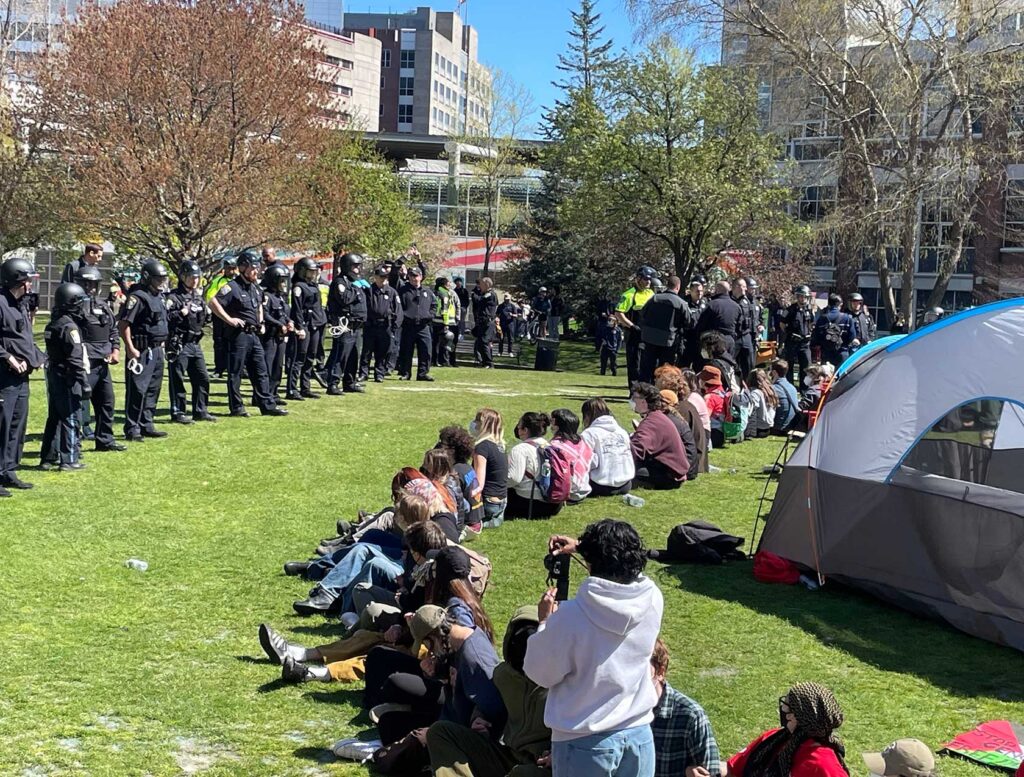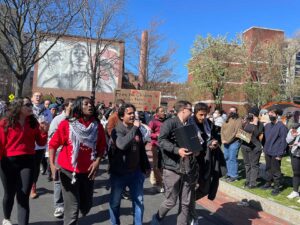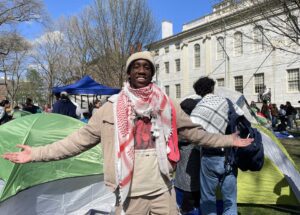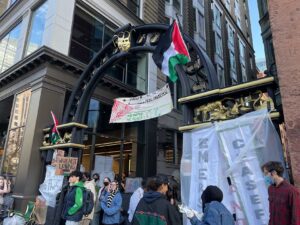Gaza protests engulf local college campuses
Students undeterred by threat of arrest and expulsion from school

Emerson University sophomore Juwaria Jama was aware of the risks confronting students demonstrating against Israel’s lethal campaign in Gaza with the arrests of students at Columbia, University of Texas and Ohio fresh in activists’ minds.
“There’s been a hard crackdown on pro-Palestinian organizing at colleges across the country,” she said, standing at the entrance to the Boylston Place alley where, in the early hours of the following day, Boston police would arrest 118 of her fellow students, throwing students to the ground and sending at least two to the hospital.
Jama said she was undeterred by the threat of arrest.
“We have a lot of people power here,” she said of the multi-ethnic coalition of protesters. “We know the majority of Emerson students support a ceasefire.”
Emerson, Northeastern, Harvard, Tufts and MIT are among the scores of colleges and universities across the country where students have erected tents in protest of Israel’s ongoing invasion in Gaza, a military operation that has claimed more than 34,000 lives, injured more than 70,000 people, displaced 1.7 million people and damaged or destroyed 62% of all homes in the territory, which Israel has held under blockade since 2007.
More than 100 journalists have been killed since the war began with a daylong Oct. 7 incursion into southern Israel by Hamas soldiers that resulted in the deaths of nearly 1,200 Israeli soldiers and civilians. Israel has also appeared to target aid workers, killing more than 200, and has targeted schools, hospitals, emergency shelters and critical infrastructure such as roads, power stations and food storage facilities in Gaza.
Last week, as U.S. news media focused on campus unrest, U.N. officials found mass graves at hospital complexes that were occupied and destroyed by Israeli soldiers. While some were casualties buried by hospital staff, others had their wrists zip tied behind their backs with gunshot wounds to the head, giving the appearance of having been executed by Israeli soldiers.
In response, students across the country are presenting universities with similar lists of demands: that colleges disclose all investments, withdraw investments from companies doing business with Israel and publicly call for a ceasefire.
“Students are taking matters into their own hands,” said third year Harvard Law School student Lea Kayali, who is Palestinian. “As an organizer for Palestine for many years, I haven’t seen this level of participation.”
The student protests that have erupted at campuses across the country have been compared to the protest movement opposing America’s war with Vietnam.
While in recent years universities have given students latitude to protest in support of causes such as divesting funds from businesses and industries associated with high greenhouse gas emissions, response to students’ calls for colleges to divest from defense contractors arming the Israeli Defense Force have been met with stiff opposition and arrests.
At many colleges, students are being met with the full brunt of the law. At Dartmouth College, where students protesting apartheid South Africa in the 1980s faced no disciplinary action for erecting shanties and occupying an administration building, two students were arrested Oct. 28 and charged with criminal trespassing for pitching a tent in front of an administration building.
As was the case at Emerson and Northeastern, universities across the United States have called on local police forces to clear student protest encampments from their campuses, sweeps that have led to often violent arrests of students. Two days after the Emerson arrests, Boston Police arrested more than 100 students in an encampment at Northeastern University. The New York Times reported more than 800 arrests as of Monday.

Students and faculty at Northeastern University called on the school to divest from companies doing business with Israel, PHOTO: YAWU MILLER
Administrators at Tufts, Harvard and MIT also indicated they would order the removal of the tent encampments on those campuses.
In the case of Emerson, where college staff were seen cleaning students’ blood from the alley the day after, the arrests drew sharp attention to those who ordered them: Mayor Michelle Wu and Police Commissioner Michael Cox in the case of Emerson and the Northeastern University administration.
Wu told reporters the Emerson students were arrested because some of the dozen or so tents they erected in the Boylston Place alley were blocking fire exits of the adjacent buildings. Her response drew fire from civil rights and civil liberties organizations.
“There is a distinction between removing encampments to ensure safe access to a public right of way and using physical violence against students engaging in peaceful expression,” reads a statement released by the ACLU of Massachusetts, which characterized Wu’s response to the demonstration as part of the national wave of cities cracking down on political expression.
City councilors Ruthzee Louijeune, Tania Fernandes Anderson and Henry Santana also issued statements opposing the police action at Emerson.
At Northeastern, university officials initially cited an antisemitic remark, “Kill the Jews,” uttered in the midst of the campus demonstration, as justification for calling in Boston police to make arrests and remove tents. But reports from GBH News and videos posted to social media showed a pro-Israel counter demonstrator who was holding an Israeli flag making the remark.
Northeastern’s press office issued a statement indicating the university stands by its decision to clear the encampment.
“The fact that the phrase ‘Kill the Jews’ was shouted is not in dispute,” the statement read in part. “Any suggestion that repulsive antisemitic comments are sometimes acceptable depending on the context is reprehensible.”
The Boston chapter of the group Jewish Voice for Peace denounced the Northeastern administration’s charges that the protests were antisemitic.
“These unfounded accusations of antisemitism — which have been wholly debunked by Northeastern student activists and video evidence — put student protestors, community members, and members of all faiths, including Jews, at risk, while diverting attention away from the genocide,” the group said in a statement.

Kojo Acheampong, Harvard student and protest organizer, says demostrators have the support of a majority of the student body. PHOTO: YAWU MILLER
Charges of antisemitism on college campuses can carry severe consequences for university officials. Harvard President Claudine Gay and University of Pennsylvania President Liz Magill were both forced to resign amid allegations from Republicans in Congress as well as university donors and board members that they hadn’t done enough to combat antisemitism on campus.
While the Anti-Defamation League cites a 337% increase in antisemitic incidents nationwide since the Oct. 7 Hamas incursion into southern Israel, the organization counts many common expressions of solidarity with Palestinians as antisemitic. The ADL considers chants such as “From the river to the sea, Palestine will be free” as antisemitic and considers the Jewish Voice for Peace and IfNotNow hate groups.
At the same time, many Jewish students have described interactions with campus protesters who have spit upon them, jostled them and used antisemitic epithets, particularly at large demonstrations at the University of Southern California and the University of California at Los Angeles. Tensions at USC have grown so high and concerns over student safety so severe that administrators called off commencement ceremonies.
The situation in Boston-area campuses has not led thus far to university leaders taking similar steps.
Asked whether he feared disciplinary action, Harvard University sophomore Kojo Acheampong, who has been organizing students to oppose the university’s investments with companies doing business with Israel, said he understood he may face sanctions.
“We’re not going to let that stop us,” he said. “We have support from students. We have support from the community. Whatever they try to do to us, we’ll be alright.”








